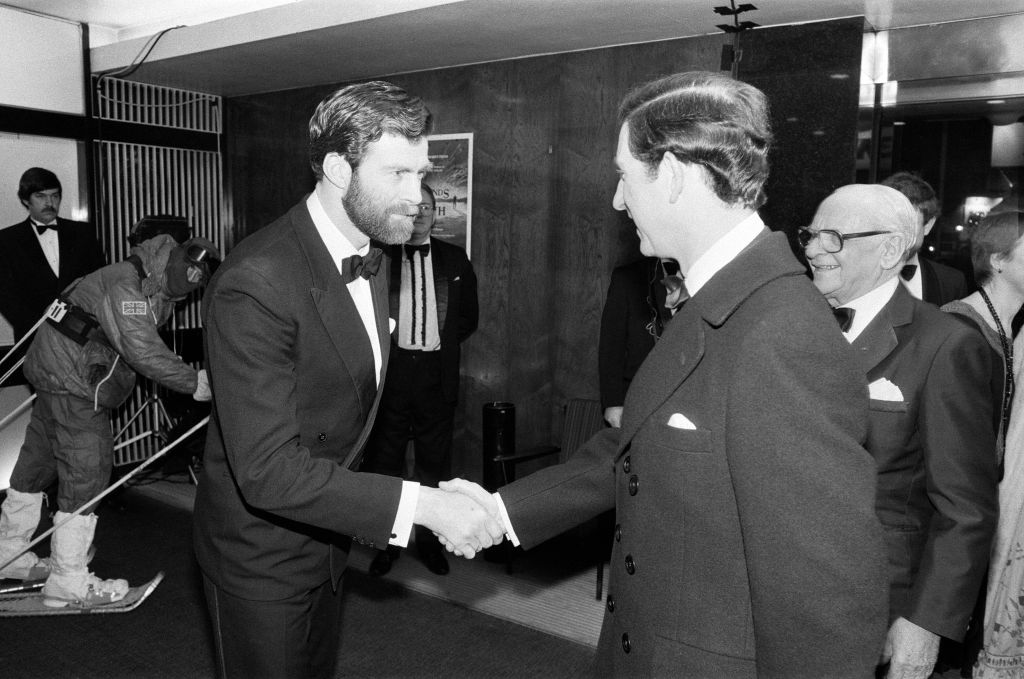Sir Ranulph Fiennes (a third cousin of Ralph, since you ask) has written a book about Lawrence of Arabia. He feels an affinity with him: he too has led Arabs in fighting, in Sir Ranulph’s case, for the Sultan of Oman. ‘I’d been in Arabia, leading Arabs against the Marxist rebels. In Lawrence’s day, the British were fighting the Germans and the Turks’.
‘It’s my DNA. My ancestors did lots of travel in new places’
The circumstances differed. ‘Lawrence had camels and was dealing with a huge body of men; I had six open-topped Land Rovers with two machine guns and I led 30 men; a mixture of Belushis and Oman Arabs and Zanzibars. I felt about the men as a family.’ What does he make of Lawrence’s extraordinary career? ‘It mystified me’, he says.
Not everyone can compare himself with Lawrence of Arabia, but not everyone has had Ranulph Fiennes’ curious career – a gentleman adventurer or, as the Guinness Book of Records has it, the world’s greatest living explorer, chiefly in the Arctic and Antarctic. He’s now 79 and he has the incisive diction and rather gentle manner of an Etonian of his era. He has a 17-year-old daughter with his second wife, Louise – ‘it’s wonderful’ – but he finds the screen habits of her generation baffling – ‘I’m not into tablets and looking at things in your hand, pressing buttons’.
Sir Ranulph has been telling his story, promoting his books and giving lectures for so long, he’s heard all the questions. There are several YouTube interviews where he recounts some of his hair-raising exploits – like sawing off the tops of his own fingers after a bad bout of frostbite or trying to conquer vertigo by climbing the North Face of the Eiger (it didn’t work).
The obvious question is, why, why, why? His exploits and records seem both dauntlessly heroic and (if it’s not a girly thing to say) unnecessary – discovering the lost city of Iram in Oman is one thing, being the first to walk across Antarctica unsupported (in 93 days) is perhaps less compelling. Innate competitiveness helps – some expeditions were prompted by the fear the Norwegians would do it first. ‘But we’re good friends now’.
But he concludes simply, ‘It’s my DNA. My ancestors did lots of travel in new places.’ He’s moved by the legacy of his absent father, who died before he was born. ‘I was brought up on wonderful stories about my dad. He was wounded five times during the war. He had an amazing time in El Alamein. Just before he died he was involved in freeing Naples. That might be subconsciously the answer. I wanted to be like him.’
He failed to follow his father into the Scots Greys: ‘I tried to get into Sandhurst College and become a colonel and get 22 years regular commission’. They needed A levels, which he lacked. But he found a calling during the Cold War in Germany, as a Venture Training Officer. When the Soviet Army didn’t attack, the men got restive; he took them camping and canoeing to stop them getting into fights.
He was by then married to his late wife, Ginny, his childhood sweetheart. She was, he says proudly, ‘the main person who planned my expeditions. She was part of it.’ That vertical crossing of the poles? ‘My late wife decided it should be done’.
To begin with, he got commercial sponsorship. ‘A long-time patron was Prince Charles’, he explains. ‘Every time we wanted to go on another expedition, we had to tell him what the next one would be.’ And that’s how Sir Ranulph turned from adventurer to charity fundraiser, which is now the sole contemporary justification for expeditions, other than scientific research. Prince Charles said that he wouldn’t have backed him if he wasn’t doing it for charity; Sir Ranulph obliged. ‘We’ve raised £19.8 million’, he says.
His life has had its vicissitudes: in the same year Ginny died, 2004, so did his ‘wonderful mother’ and two of his sisters. ‘The first year or two was pretty bad.’ He got through grief by getting on with things. Not long afterwards he met his second wife, which, he feels, Ginny would have wanted. He’s also sustained by his Christian faith – ‘It’s very comforting’.
He feels his age – ‘I don’t know anyone over 75 who doesn’t’ – but doesn’t sound keen to become merely the oldest person to achieve records, though his third attempt at Everest was ‘when I was an OAP’, itself a record. He does, however, thoughtfully observe that he’d heard last week of a lady of 100, who had done a free fall from a plane.
Sir Ranulph is hosting an evening to discuss his latest book at the Harrogate Literature Festival on 21 October.






Comments